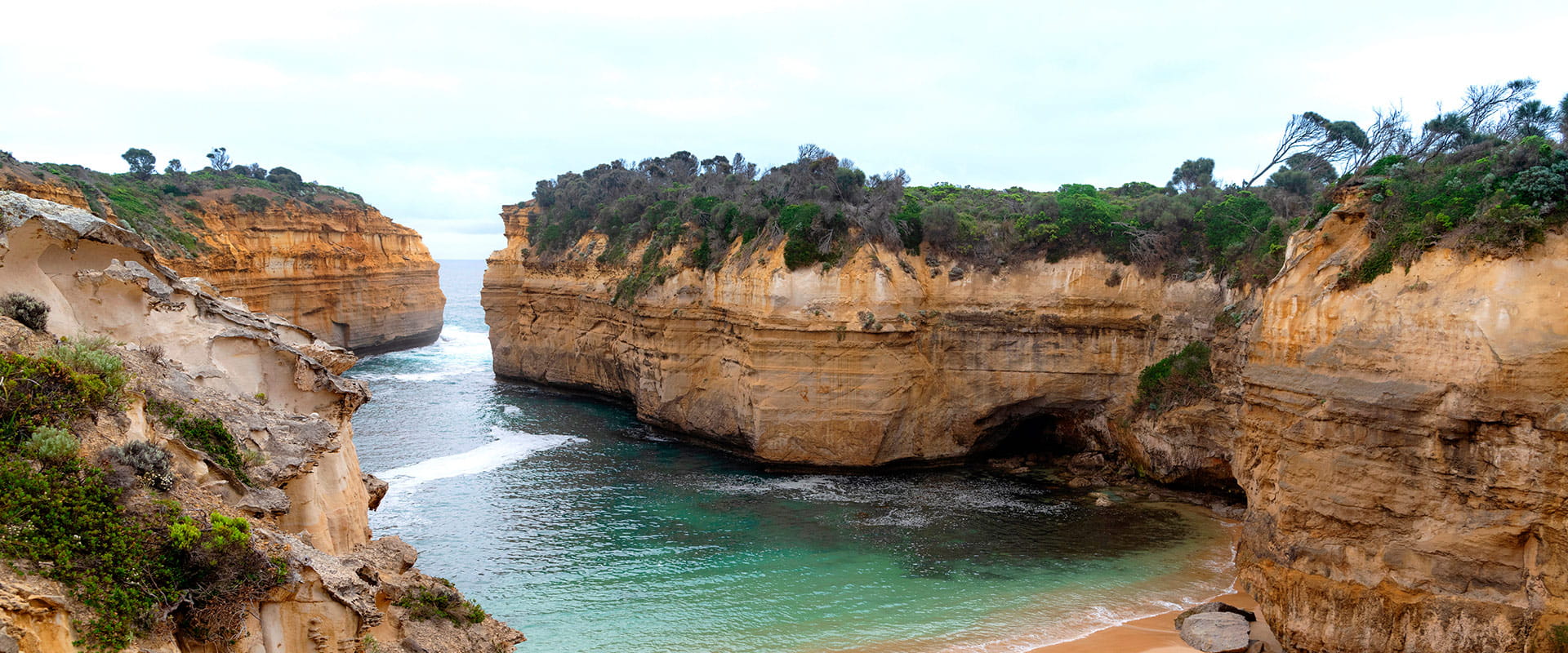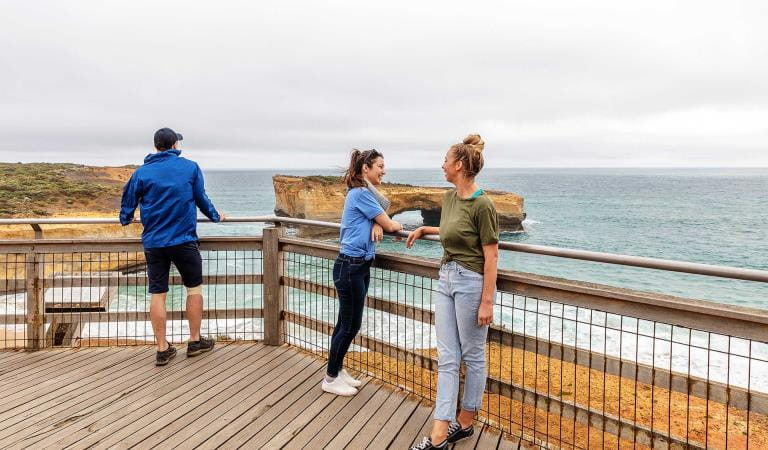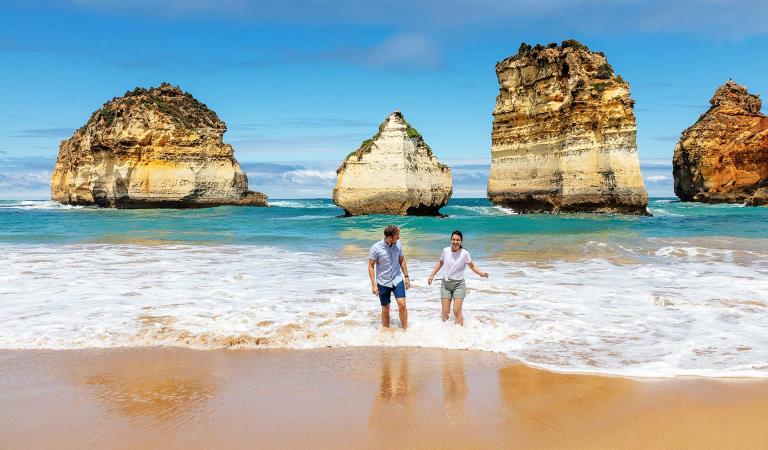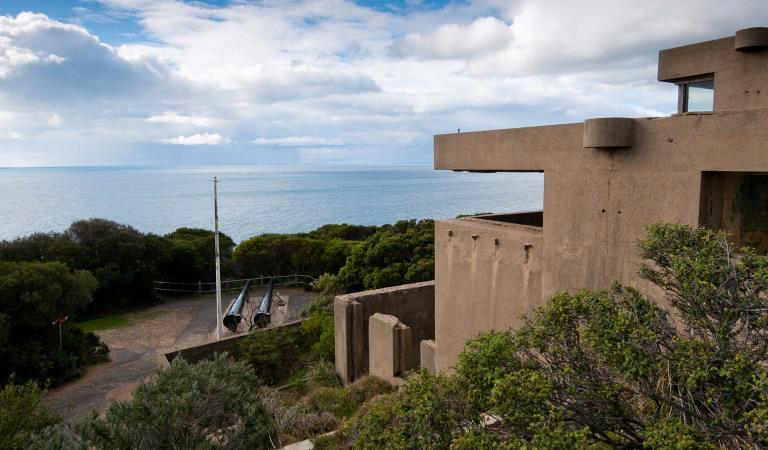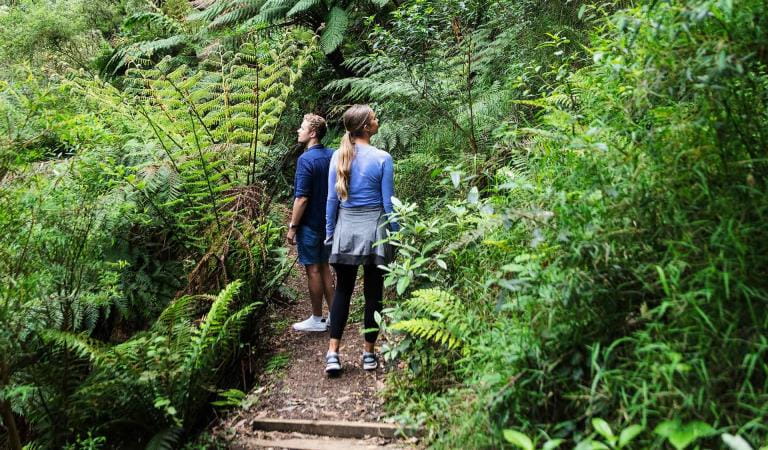Loch Ard Gorge is the site of the most famous shipwreck on the aptly named Shipwreck Coast. The Loch Ard ran aground crashing into Mutton Bird Island in 1878. The only two survivors Tom Pearce and Eva Carmichael managed to drag themselves to the safety of the beach inside Loch Ard Gorge. For a moment, these two tragic teenagers were the talk of the English-speaking world, which very much hoped they would marry (they did not). Walk along this sandy beach, dramatically closed in by towering sandstone cliffs. Explore several other short walks in this area including the cemetery where Tom and Eva’s less fortunate shipmates are buried.
A short walk from Loch Ard Gorge, Mutton Bird Island used to be called ‘The Sow’ back in the days when the Twelve Apostles were known as ‘The Sow and Piglets’. Every spring and summer the island is home to a noisy colony of Short-tailed Shearwaters (aka muttonbirds). Every day at dusk between October and April, these birds flock home to their burrows in their thousands, to feed hungry chicks. Experience this incredible natural event before heading to Port Campbell for dinner and an overnight stay.
Things to do in the area
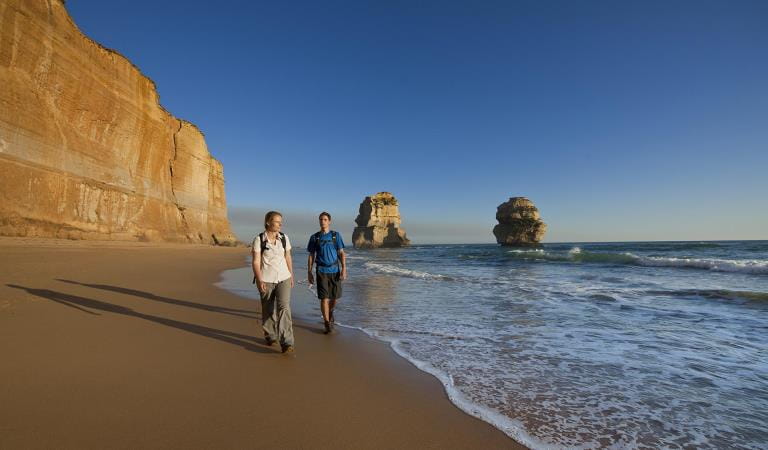
Gibson Steps
London Bridge
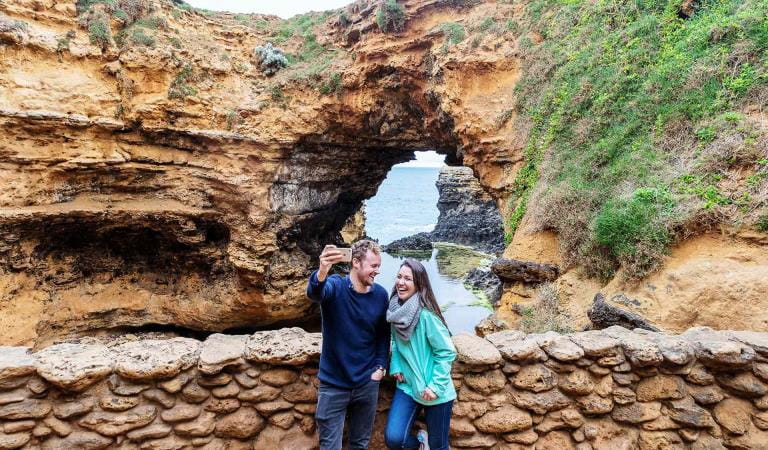
The Grotto
Twelve Apostles
How to get there
Loch Ard Gorge
When you're there
There are several easy walking tracks and three of them have storyboards revealing the area's wildlife, history and geology:
- Geology Walk - Discover the secrets of the forces that shape the coastline on this easy self‐guided walk.
- Shipwreck Walk - Follow the tragic story of the Loch Ard shipwreck site to the cemetery. This amazing story of courage and survival is also featured in Warrnambool’s Flagstaff Hill Maritime Village.
- Living on the Edge - Discover the lives of plucky Short-tailed Shearwaters on the edge of the sheer cliffs. This easy walk encompasses the Mutton Bird Island viewing platform, Thunder Cave and Broken Head.
Download the Port Campbell National Park visitor guide for more information about the park and the plethora of experiences to be had within its borders.
Need to know
Loch Ard Gorge
Accessibility
Visiting a park can be more of a challenge for people with disabilities, however in Victoria there are a wide range of facilities to help people of all abilities enjoy our wonderful parks around the state.
To make it easier for people with limited mobility to see the all abilities access and experiences on offer at Twelve Apostles and Loch Ard Gorge walks, Parks Victoria has released this video - produced and narrated by accessibility advocate Ryan Smith, who uses a wheelchair.
Assistance dogs are welcome in Parks Victoria parks and reserves. Entry requirements apply for parks and reserves that are usually dog prohibited, such as national parks.
Tread lightly as the coast is fragile and your safety matters. Stick to marked trails to avoid injury, and to protect the delicate coastal vegetation and wildlife that call the park home.
Change of Conditions
Nature being nature, sometimes conditions can change at short notice. It’s a good idea to check this page ahead of your visit for any updates.
-
Loch Ard Gorge (Port Campbell National Park)
Reduced access to Loch Ard Gorge visitor areas
Loch Ard Gorge beach access closedBeach access is closed due to dangerous cliff movement near the Upper Lookout, which could cause a collapse. Geotechnical specialists have assessed the site and we will continue to work through the permits required to protect the significant cultural and environmental values of Loch Ard before we start work to restore access to the beach.This work is complex and will take time. Parks Victoria will provide updates and indicative timelines once we have further information.Closed walking tracks and reduced carparking - The Blowhole, Thunder Cave, Sherbrook RiverConstruction of a new lookout at The Blowhole will commence in January 2024, creating a stunning new visitor attraction for the Loch Ard Gorge precinct. The project is expected to take 12 months, subject to on-ground and construction industry conditions.
To ensure public safety during construction, access to some tracks and areas around The Blowhole will be closed, including no access to Thunder Cave and Sherbrook River. There will also be a reduction in the number of carparking spaces available for the public at the Loch Ard Gorge precinct, and no parking near Sherbrook River. Turning circles will also be restricted due to the construction works. Caravans and other long vehicles will be required to park in the Loch Ard Gorge car park. -
Twelve Apostles (Port Campbell National Park)
Saddle Lookout - access change
From mid-September 2021 there will be no access to the Saddle and Castle Rock viewing areas while a new lookout is being built.
Visitors can continue to enjoy the other lookouts, boardwalks and visitor areas at the Twelve Apostles and the other spectacular visitor sites in the Port Campbell National Park.For more information https://www.parks.vic.gov.au/projects/western-victoria/saddle-lookout


